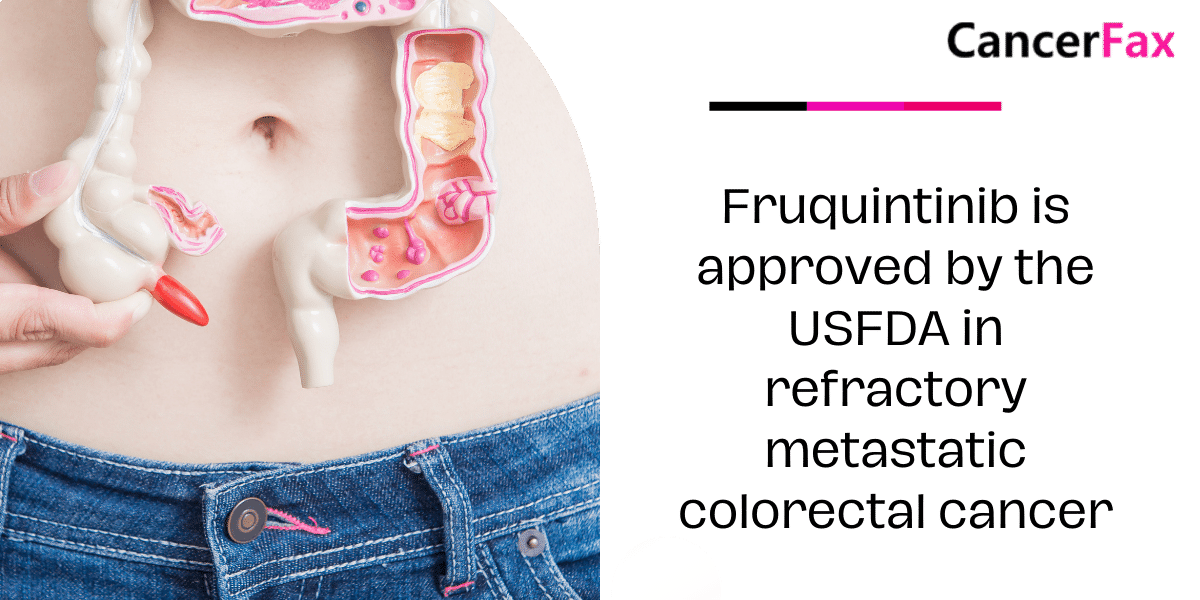The Food and Drug Administration approved fruquintinib (Fruzaqla, Takeda Pharmaceuticals, Inc.) on November 8, 2023, for adult patients with metastatic colorectal cancer (mCRC) who have undergone specific prior treatments.
The effectiveness was assessed in FRESCO-2 (NCT04322539) and FRESCO (NCT02314819). The FRESCO-2 trial (NCT04322539) assessed 691 patients with mCRC who experienced disease progression after previous fluoropyrimidine-, oxaliplatin-, irinotecan-based chemotherapy, anti-VEGF biological therapy, anti-EGFR biological therapy (if RAS wild type), and at least one of trifluridine, tipiracil, or regorafenib. It was an international, multicenter, randomized, double-blind, placebo-controlled study. The FRESCO trial, a multicenter study in China, assessed 416 patients with metastatic colorectal cancer who experienced disease progression following previous fluoropyrimidine-, oxaliplatin-, and irinotecan-based chemotherapy.
In both trials, patients were randomly assigned to either get fruquintinib 5 mg orally once a day or a placebo for the first 21 days of each 28-day cycle. They also got the best possible supportive care. Patients were treated until disease progression or unacceptable toxicity occurred.
The primary effectiveness outcome in both trials was overall survival (OS). The median overall survival in the FRESCO-2 study was 7.4 months (95% CI: 6.7, 8.2) for patients who received fruquintinib and 4.8 months (95% CI: 4.0, 5.8) for those in the placebo group. The hazard ratio was 0.66 (95% CI: 0.55, 0.80) with a p-value of less than 0.001. In the FRESCO study, the median overall survival was 9.3 months (95% CI: 8.2–10.5) for the first therapy group and 6.6 months (95% CI: 5.9–8.1) for the second. The hazard ratio was 0.65 (95% CI: 0.51, 0.83) and the p-value was less than 0.001.
The prevalent side effects (experienced by 20% or more of patients) included hypertension, palmar-plantar erythrodysesthesia, proteinuria, dysphonia, abdominal pain, diarrhea, and asthenia.
The suggested fruquintinib dosage is 5 mg taken orally once a day, with or without food, for the initial 21 days of a 28-day cycle until disease progression or intolerable toxicity.

Targeting FGFR4 and CD276 with CAR T-cells demonstrates a strong antitumor impact against children rhabdomyosarcoma
Chimeric antigen receptor (CAR) T-cells that specifically target Fibroblast Growth Factor Receptor 4 (FGFR4), a surface tyrosine receptor that is extensively expressed in rhabdomyosarcoma (RMS), are now undergoing clinical research. However, the effectiveness of these CAR T-cells may be hindered by tumor heterogeneity and inadequate activation. In this study, we present a method to enhance the co-stimulatory and targeting characteristics of a FGFR4 CAR through an optimization process. We substituted the hinge and transmembrane domain of CD8 as well as the 4-1BB co-stimulatory domain with the corresponding domains of CD28. The CARs produced exhibit heightened anti-tumor efficacy in multiple RMS xenograft models, with the exception of the RMS559 cell line, which is known for its aggressive nature.

